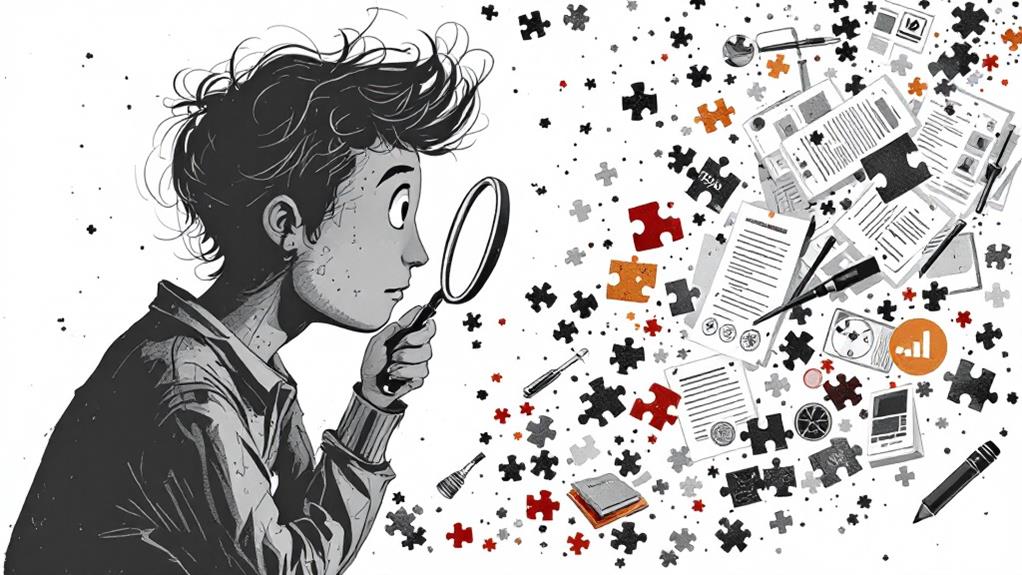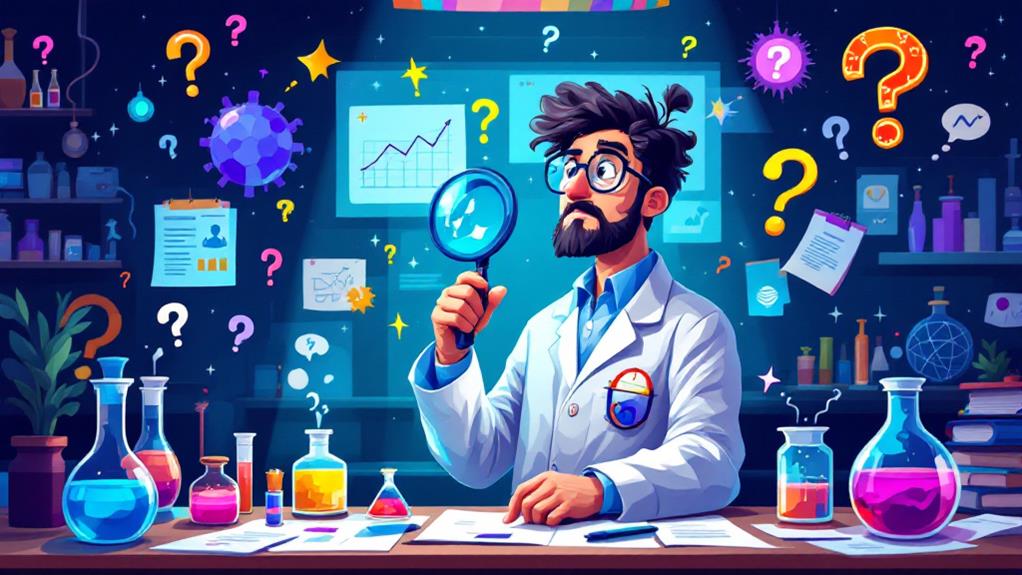What Does It Mean to Be Skeptical?

Being skeptical means you critically question and evaluate information before accepting it as true. You don't simply dismiss claims but instead seek solid evidence, helping you distinguish between fact and conjecture. It fosters an active inquiry into the knowledge and beliefs you encounter. Skepticism isn't about cynicism; it involves a proactive approach to understanding, seeking diverse viewpoints, and avoiding biases. By developing a skeptical mindset, you improve your decision-making skills and lead a life rich with lifelong learning and curiosity. If you wish to uncover more facets of skepticism's role, there's much more to investigate.
Defining Skepticism
Amid a world filled with information, defining skepticism becomes vital. You encounter a constant barrage of claims, opinions, and data, making it significant to adopt a mindset that effectively navigates this landscape. Skepticism isn't about doubting everything but involves critical thinking and a willingness to engage in philosophical inquiry. It's a disciplined approach where you question the validity of information before accepting it as truth. By doing so, you guarantee that your beliefs and decisions are grounded in reason and evidence. Skepticism as a position is not an outright rejection of claims but rather involves healthy doubt and demands evidence and coherence. When you accept skepticism, you're not rejecting ideas outright. Instead, you're scrutinizing them, analyzing their sources, methods, and underlying assumptions. Critical thinking empowers you to differentiate between well-supported facts and mere conjecture. Philosophical inquiry plays a role by encouraging you to investigate deeper questions about knowledge, belief, and evidence. You learn to weigh the strength of arguments, recognize biases, and identify logical fallacies.
The Importance of Questioning

Embracing the habit of questioning sharpens your understanding and decision-making. When you question, you engage in critical thinking, which allows you to analyze information, weigh evidence, and form a well-rounded perspective. This process helps you avoid taking information at face value and encourages a deeper exploration of ideas. By examining claims, such as those from pseudoscience, you can discern credible information from unfounded assertions. It's not about doubting everything you encounter but rather fostering a healthy skepticism—an openness to reevaluating your beliefs and assumptions when faced with new evidence or perspectives.
By regularly questioning, you develop the ability to identify biases and detect misinformation. This skill is essential in a world where information is abundant, but not always accurate. Questioning leads you to seek multiple sources, compare differing viewpoints, and understand the context before forming judgments. It empowers you to make informed decisions rather than relying on unexamined beliefs or external influences.
Moreover, questioning encourages lifelong learning and curiosity. It keeps your mind active and open, inviting new insights and innovations. By practicing critical thinking and maintaining a healthy skepticism, you cultivate a mindset that values truth and understanding, ultimately enriching your personal and professional life.
Skepticism vs. Cynicism

How can you tell the difference between skepticism and cynicism? It starts with understanding their core attitudes. Skepticism involves questioning and seeking evidence before accepting claims. It's a proactive approach that accepts uncertainty and encourages learning. When you practice healthy skepticism, you engage in skeptical thinking, which means you evaluate information critically and remain open to changing your mind based on new evidence.
Cynicism, on the other hand, is characterized by a general distrust of people's motives and a belief that others are driven by self-interest. Unlike skepticism, cynicism often leads to a negative outlook and a tendency to dismiss ideas or information without thorough examination. It can cloud your judgment and prevent you from seeing potential truths or solutions.
To cultivate healthy skepticism, focus on asking questions, seeking reliable sources, and analyzing evidence. Accept the idea that you may not have all the answers and be willing to adapt your views. Avoid slipping into cynicism by reminding yourself that while not all claims are valid, not everyone has hidden agendas. By maintaining a balance, you can remain open-minded and informed without becoming overly critical or doubtful.
Historical Perspectives

While skepticism and cynicism shape our modern thinking, their roots stretch far back into history. Ancient philosophers like Pyrrho and Sextus Empiricus laid the groundwork for skepticism, questioning the certainty of knowledge and promoting philosophical debates. They believed that suspending judgment led to peace of mind. This early skepticism wasn't just academic; it influenced cultural skepticism and skepticism in politics during their times.
As history progressed, religious skepticism emerged, challenging the dogmas of established religions. Thinkers questioned narratives and sought moral truths beyond religious doctrine. This led to broader discussions on skepticism and morality, encouraging individuals to question not only religious beliefs but also ethical standards.
With the Enlightenment, skepticism took a more prominent role. Enlightenment thinkers like David Hume and Voltaire pushed for reason over tradition, influencing modern skepticism. They argued for evidence-based thinking, which still echoes today. In contemporary times, skepticism continues to evolve, shaping discussions in politics, ethics, and culture.
- Ancient philosophers questioned the certainty of knowledge.
- Religious skepticism challenged established dogmas.
- Enlightenment thinkers emphasized reason over tradition.
Understanding these historical perspectives helps you appreciate the rich tapestry of skepticism throughout the eras.
The Role of Evidence

Evidence often plays a critical role in shaping our understanding and beliefs. When you're approaching a claim or statement, it's crucial to evaluate the evidence presented. You shouldn't just accept things at face value. Instead, dig deeper and seek empirical validation. This means looking for data or observations that support the claim. Without solid evidence, your understanding remains on shaky ground.
Engaging in critical analysis is another key component of being skeptical. It involves examining the quality and source of the evidence. Ask yourself, is the evidence reliable? What methods were used to gather it? Are there biases or conflicts of interest involved? By questioning these aspects, you can better assess the validity of the information you're dealing with.
Moreover, evidence should withstand scrutiny from multiple angles. Don't just rely on a single piece of evidence; look for corroborating data from different sources. This broader perspective helps you form a well-rounded view. Remember, skepticism isn't about doubting everything; it's about being open-minded yet discerning. By focusing on empirical validation and critical analysis, you improve your ability to make informed decisions and avoid being swayed by unsubstantiated claims.
Skepticism in Science

In the domain of scientific inquiry, skepticism is a vital tool that fuels progress and innovation. By questioning assumptions and seeking empirical evidence, you engage in critical thinking that drives revelations. When you test hypotheses, skepticism guarantees that your findings are grounded in solid data. The scientific method thrives on this approach, as it requires falsifiability and rigorous testing to validate claims.
To effectively practice skepticism in science, consider these principles:
- Peer Review: Always value the importance of peer review to guarantee that research stands up to scrutiny from others in the field.
- Data Interpretation: Approach data interpretation with an open mind, recognizing that data can be misunderstood or misrepresented.
- Reproducibility: Be aware of the reproducibility crisis, emphasizing the need for results that can be reliably duplicated.
Incorporating skepticism into your research entails adhering to research ethics, questioning results, and challenging existing theories. Interdisciplinary skepticism allows you to investigate different fields, offering fresh insights and preventing blind spots. By maintaining a critical eye, you're contributing to a more robust and reliable scientific landscape. Remember, skepticism isn't about doubt for its own sake—it's about aspiring for truth through rigorous analysis and inquiry.
Everyday Applications

Skepticism isn't confined to the lab; it plays a significant role in everyday decision-making. You encounter a sea of information daily, from news articles to social media posts. Applying critical thinking helps you question the credibility of these sources. Instead of accepting everything at face value, you examine the evidence and motives behind the information. This approach guarantees that you're not swayed by sensational headlines or misinformation.
Healthy doubt is your ally when making personal choices. Regardless of whether you're deciding on a major purchase or choosing a service provider, skepticism encourages you to ask questions and seek out reviews or testimonials. It helps you weigh the pros and cons, guaranteeing your decisions are well-informed and not impulsive. When friends or family share advice, a skeptical mindset prompts you to reflect on their perspective while also evaluating its relevance to your situation.
In essence, skepticism equips you with a toolkit for maneuvering through the complexities of daily life. It empowers you to make decisions based on reason and clarity, rather than assumption or bias. By embracing skepticism, you cultivate a mindset that values truth and accuracy in all aspects of life.
Common Misconceptions

Amidst the practice of skepticism, there are some common misconceptions that often arise, leading to confusion about what it truly entails. You might think being skeptical means denying everything or rejecting all belief systems. However, true skepticism involves using critical thinking to evaluate information, not dismissing it outright. It requires scientific literacy to navigate media influence and recognize confirmation bias, ensuring your deductions aren't shaped solely by what you want to believe.
A few misconceptions about skepticism include:
- It's just about doubting everything: Skepticism isn't about cynicism; it's about questioning and seeking evidence through philosophical inquiry.
- Emotions don't belong in skepticism: Emotional reasoning can cloud judgment, but understanding its role in personal experiences and social dynamics is essential.
- Skepticism is culturally biased: While cultural perspectives might influence how skepticism is practiced, it transcends any single worldview by promoting universal critical inquiry.
When you engage in skepticism, it's not a battle against belief systems but a way to refine them through evidence and reason. By understanding these misconceptions, you can better appreciate skepticism's role in promoting thoughtful analysis, open-mindedness, and informed decision-making in a complex world.
Developing a Skeptical Mindset

Understanding common misconceptions about skepticism lays the groundwork for developing a skeptical mindset. To cultivate this mindset, start by embracing critical thinking. This means actively engaging in reflective questioning and analytical reasoning when presented with new information. Be open-minded, allowing yourself to contemplate diverse perspectives without letting preconceived notions cloud your judgment.
Evidence evaluation is key. Scrutinize the credibility of sources and weigh the validity of the evidence before forming deductions. This practice strengthens your information literacy, enabling you to discern fact from fiction. Intellectual curiosity will drive you to investigate topics deeply, challenging you to go beyond the surface and seek out reliable knowledge.
Recognize your own cognitive biases and how they might influence your belief systems. Being aware of these biases helps refine your decision-making process, allowing you to make informed choices based on evidence rather than assumptions. Regularly question your beliefs and the beliefs of others, fostering an environment of continuous learning.
Ultimately, developing a skeptical mindset is about balance. It combines the willingness to question and challenge, with the openness to adapt and learn. This approach not only enriches your understanding but also improves your ability to navigate an increasingly complex world.
Challenges of Being Skeptical

In a world flooded with information, being skeptical can sometimes feel overwhelming. You're constantly bombarded by data, making it tough to apply critical thinking without succumbing to information overload. It's easy to fall into cognitive biases, like confirmation bias, where you seek out information that aligns with your personal beliefs, rather than challenging them. Social pressures and cultural influences can also make skepticism difficult, as questioning widely accepted norms might lead to isolation.
Consider these challenges:
- Trust Issues: It's hard to know whom to believe, especially when misinformation is rampant.
- Emotional Reactions: Skepticism can trigger defensive or emotional responses from others, complicating discussions.
- Communication Barriers: Effectively conveying your skepticism without offending or alienating people can be difficult.
Moreover, you might face internal conflicts as you balance skepticism with your own personal beliefs. Everyone's susceptible to cognitive biases, and recognizing them is vital. Emotional reactions can cloud judgment, making it challenging to remain objective. Yet, maintaining a healthy level of skepticism is fundamental in traversing today's complex information landscape. By understanding these challenges, you can better equip yourself to tackle them, fostering more informed and meaningful conversations.



